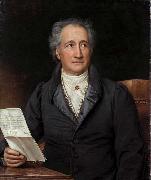Wholesale Oil Painting No Minimum |
|||||||||||
|
|
|||||||||||

|
|||||||||||
|
|
|
||||||||
Joseph StielerGerman Painter, 1781-1858,German painter. In 1798 he studied under Christoph Fesel (1737-1805) in Werzburg and in 1800 with Heinrich Feger in Vienna, where his style was strongly influenced by English portraiture. After he studied in Paris (1807-8) with Fran?ois G?rard the influence of Neo-classicism became apparent in his work. He visited Italy in 1809, 1810 and 1812 to do commissioned portraits for various patrons, among them Prince Eugene de Beauharnais (1809; Munich, Bayer. Nmus.) and Joachim Murat, King of Naples (reg 1808-15). In 1812 he went to Munich where he did work for middle-class clients, the nobility and the royal family of Bavaria (e.g. the portrait of Maximilian I Joseph, 1816; Ellingen, Schloss). In 1820 he was appointed court painter to Ludwig I, King of Bavaria (reg 1825-48), and painted several portraits of him. In 1823 he helped co-found the Kunstverein in Munich. He was one of the most important portrait painters in the Neo-classical style, specializing particularly in studies of women, as seen in the 36 portraits commissioned by Ludwig I for the Schenheitsgalerie (1827-42; Munich, Schloss Nymphenburg). In his portraits for the middle classes and for the court he devised certain peculiarities of form. He painted various members of the royal houses of Austria, Prussia and Sweden, as well as members of the nobility in the duchies of Saxe-Altenberg, Saxe-Coburg and Hesse. His sitters also included some of the most important figures in the political and intellectual life of Germany in the first half of the 19th century. He painted the pendant portraits of Franz Brentano and Antonie Brentano (both 1808; Winkel, Brentanohaus), Johann Wolfgang von Goethe (1828; Munich, Neue Pin.) and Ludwig Tieck (1838; Berlin, Schloss Charlottenburg), the geographer and botanist Alexander von Humboldt (1843; Potsdam, Schloss Charlottenhof) and the musician Ludwig van Beethoven (Bonn, Beethoven-Haus). After 1845 the classical elements in his paintings were sometimes combined with an application of colour typical of plein-air studies. He also painted genre pictures and religious scenes. |
||||||||
|
|
||||||||
Johann Wolfgang von Goethe
Johann Wolfgang von Goethe Painting ID:: 43998 |
1828
Oil on canvas,
78,0 x 63,8 cm 1828 Oil on canvas, 78,0 x 63,8 cm |
|||||||
|
|
||||||||
|
Angelika Kauffmann 1741-1807,Swiss neoclassical painter and graphic artist. From her youth she was known for her artistic, musical, and linguistic abilities. She went to England, where she enjoyed success as a fashionable portrait painter and decorator. A protegee of Sir Joshua Reynolds, Kauffman was one of the original members of the Royal Academy. She often decorated houses designed by the Adam brothers. After her marriage in 1781 to the Venetian painter Antonio Zucchi, she lived in Italy, where she flourished in artistic and literary circles. Reynolds, Winckelmann, Goethe, and Garrick commissioned her to paint their portraits. Representative works include Religion (National Gall., London); Self-Portrait (Staatliche Museen, Berlin); and the etchings of L'Allegra and La Pensierosa. The British Museum has a collection of her drawings and prints. Johann Wolfgang von Goethe mk180 1787 Goethe-Nationalmuseum Klassik stiftung Weimar |
||||||||
|
|
||||||||
|
Prev Next
|
||||||||
|
|
||||||||
|
Related Paintings to Angelika Kauffmann :. |
||||||||
|
|
||||||||
|
CONTACT US |

